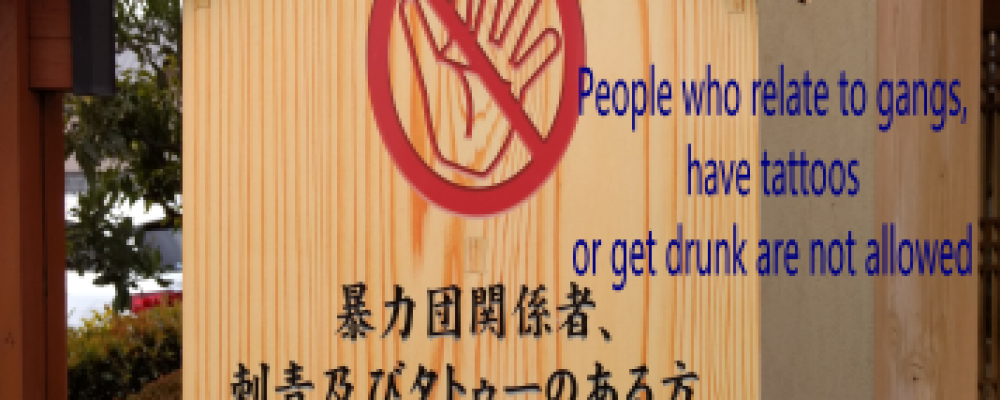First of all, Japanese people do NOT hate tattoos. They just are afraid of it.
You should know why before you head to Japan.
When did the image “Tattoo=Criminal” be started?
Few years ago, banning people who have tattoos from entering public baths had become a topic.
Why do the owners of hot springs or public baths not allow tattooed people in? There is a long history.
In the Jomon era (B.D. 1400-B.D. 400), Tattoos were a kind of identification. However, in the Nara era (710-794), they were one of punishments for criminals. In the Edo era (1603-1868), tattoos seemed to be different depending on the region.
The funny thing is that in the Kinki region, it appeared that the tattoo inked on a criminal’s arm was the word “悪(evil)”, which let people know what crime the person had committed. In addition to that, criminals who repeatedly committed crimes often had the characters such as “犬 (dog)” tattooed on their foreheads.
In the Meiji era, the government tried to modernise the national system and the tattoo punishment was abolished in 1872. The act of tattooing became forbidden (it was considered barbaric).
From then on, tattoos were illegal in Japan until 1948.
Against this historical background, it seems that tattoos continue to be regarded as antisocial till the present (to this day), and “negative” images towards tattoos have become established in Japan.
Tattooing culture had not faded among gangs
Even if tattoos were forbidden in the Meiji era, gangs continued to the tradition of tattooing. They were used to prove loyalty to their belonging organization. As a result, “tattoo = gangsters” was created, and it can be said that the appearance of tattoos led to intimidating others.
Also, as you can imagine in the past, not every family had a bath. In the era when many people went to public baths, if people who had tattoos were allowed in the baths, the possibility that the surrounding people might have felt intimidated.
In consideration of customers’ safety and security, it is believed that even now, many public bath facilities and hot spring facilities (especially those owned by private companies) are still enforcing to entry restrictions.
Japanese people are used to seeing the sign of “Tattooed people or gangsters are not allowed” at entrances since they were young (image as thumnail). This has caused “tattoo stereotype”.
How many Japanese people mind tattooed people being in the public baths
Yahoo Japan polled this question in 2016 and the poll total was 273,104.
Source: https://news.yahoo.co.jp/polls/life/22342/result (in Japanese).
It says that 46.2% agreed with “Tattooed people should not be in.”, 31.3% agreed with “Tattooed people should be allowed if they can conceal their tattoo.”, 17.8% agreed with “Tattooed people should be allowed in”, then remainder voted “Others”.
We Japanese should try to change our attitudes about tattoos and be more welcoming to all people. Japan might never become the number one in terms of hospitality unless this is resolved.


Pingback: writeaessay
Thank you very much for your comment!